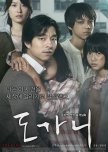This review may contain spoilers
If a Country Won't Save The Children, Then Who Will?
What is the price of a child? As depicted in this film, it’s either a job promotion or money. I would never have believed that anyone—a parent, grandparent, teacher, prosecutor, or judge--could put a price on a child's well-being. And perhaps that is the most disturbing aspect of this story.
Anyone who abuses a child is not fit to even call themselves “human.” These are the vilest and most depraved cowards of any human society.
It has always been extremely difficult to watch any film regarding child abuse. I’m a TEFL teacher, and to even fathom anyone hurting or abusing any of my students literally makes my stomach ache and my anger rise.
I’ve since watched three films that are difficult to watch, and this one was no different. In fact, I had to watch this movie over two-nights because I had to stop it halfway through because I was becoming so outraged. “Sophie’s Choice” is an extraordinary film, and it’s also one that I can never watch again. I can still hear the little girl’s screams as she’s being taken away. “Hope” is another one about a Korean girl who was raped in the most horrifying way imaginable. It’s also another film I can never watch again. “Silenced” is now the third. And as good as it was, I already know that I can never watch this movie again.
Based on a true story, “Silenced” is about the teaching staff at a prestigious school in the town of Mujin. A school for the deaf. A new teacher shows up, and he’s excited about embarking upon his new career until he uncovers a terrible truth: the children are being sexually and physically abused. An especially disturbing scene shows a staff member mercilessly beating a young boy, and yet the new teacher—Kang In Ho—simply stands there and does nothing.
The headmaster and his twin brother are well-known throughout the town for their philanthropy. And in a world where money talks, they are more than capable of buying the silence and lies of the staff, prosecutor, defending attorney, judge, and anyone else who dares to stand in their way.
Despite the evidence and unequivocal records of abuse, family members settle on behalf of their children for money. Such people can never be called “parents” or anything of the sort. They simply see their children as a means to acquire money and nothing more. And as a result, the judge gives out sentences that are so laughable, that if it weren’t so tragic, one just might utter a chuckle in response.
The film is as dark as the fog-bound town of Mujin itself, with few likable characters. Kang In Ho’s own cowardly mother tells him to just let it go because there is no point in doing what’s right. It’s easy to say that until you meet the children face-to-face and gain some empathy and perspective about what THEY have had to endure.
This movie brought a real problem to light in Korea. It forced people to ask what the price of a child is, and what happens when corruption and greed are more powerful than justice itself.
Children are not property! They are not there for you to use at your whim! They are not there for you to live vicariously through, nor are they there to be responsible for your own problems. Anyone who uses children in any such manner are child abusers. You do not own your children. And Korea—as well as much of the world—needs to understand just how far and extensive their child abuse runs. This movie brought to light an extreme case, and still, Korea has failed to listen. Why? Because of the indifference of its people. They simply do not care enough.
I was a bit disappointed by Gong Yoo’s performance. I’m not sure how anyone can simply stand there without any expression of outrage or even concern. Yes, he finally bashes the teacher over the head with a plant, but for the most part, Gong Yoo looks lost with almost placid and indifferent expressions. His own mother berates him for standing firm, and all he can say to her is, “I’m sorry.” Amazing that there is no effort to explain the situation and why it’s of the utmost importance.
This isn’t an easy movie to watch, but it’s a necessary one as it puts a spotlight on a horrendous and truly terrifying problem. People often wonder if there are monsters in this world. Just look at the members of the school staff, their families, the prosecutor, and defending attorney, and the judge to realize the truth—yes, there are, indeed, monsters in this world. And they all need to be fought and defeated. If not, then who will save the children?
Anyone who abuses a child is not fit to even call themselves “human.” These are the vilest and most depraved cowards of any human society.
It has always been extremely difficult to watch any film regarding child abuse. I’m a TEFL teacher, and to even fathom anyone hurting or abusing any of my students literally makes my stomach ache and my anger rise.
I’ve since watched three films that are difficult to watch, and this one was no different. In fact, I had to watch this movie over two-nights because I had to stop it halfway through because I was becoming so outraged. “Sophie’s Choice” is an extraordinary film, and it’s also one that I can never watch again. I can still hear the little girl’s screams as she’s being taken away. “Hope” is another one about a Korean girl who was raped in the most horrifying way imaginable. It’s also another film I can never watch again. “Silenced” is now the third. And as good as it was, I already know that I can never watch this movie again.
Based on a true story, “Silenced” is about the teaching staff at a prestigious school in the town of Mujin. A school for the deaf. A new teacher shows up, and he’s excited about embarking upon his new career until he uncovers a terrible truth: the children are being sexually and physically abused. An especially disturbing scene shows a staff member mercilessly beating a young boy, and yet the new teacher—Kang In Ho—simply stands there and does nothing.
The headmaster and his twin brother are well-known throughout the town for their philanthropy. And in a world where money talks, they are more than capable of buying the silence and lies of the staff, prosecutor, defending attorney, judge, and anyone else who dares to stand in their way.
Despite the evidence and unequivocal records of abuse, family members settle on behalf of their children for money. Such people can never be called “parents” or anything of the sort. They simply see their children as a means to acquire money and nothing more. And as a result, the judge gives out sentences that are so laughable, that if it weren’t so tragic, one just might utter a chuckle in response.
The film is as dark as the fog-bound town of Mujin itself, with few likable characters. Kang In Ho’s own cowardly mother tells him to just let it go because there is no point in doing what’s right. It’s easy to say that until you meet the children face-to-face and gain some empathy and perspective about what THEY have had to endure.
This movie brought a real problem to light in Korea. It forced people to ask what the price of a child is, and what happens when corruption and greed are more powerful than justice itself.
Children are not property! They are not there for you to use at your whim! They are not there for you to live vicariously through, nor are they there to be responsible for your own problems. Anyone who uses children in any such manner are child abusers. You do not own your children. And Korea—as well as much of the world—needs to understand just how far and extensive their child abuse runs. This movie brought to light an extreme case, and still, Korea has failed to listen. Why? Because of the indifference of its people. They simply do not care enough.
I was a bit disappointed by Gong Yoo’s performance. I’m not sure how anyone can simply stand there without any expression of outrage or even concern. Yes, he finally bashes the teacher over the head with a plant, but for the most part, Gong Yoo looks lost with almost placid and indifferent expressions. His own mother berates him for standing firm, and all he can say to her is, “I’m sorry.” Amazing that there is no effort to explain the situation and why it’s of the utmost importance.
This isn’t an easy movie to watch, but it’s a necessary one as it puts a spotlight on a horrendous and truly terrifying problem. People often wonder if there are monsters in this world. Just look at the members of the school staff, their families, the prosecutor, and defending attorney, and the judge to realize the truth—yes, there are, indeed, monsters in this world. And they all need to be fought and defeated. If not, then who will save the children?
Was this review helpful to you?


 1
1













